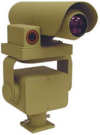 On December 3, Philip Cheng from Cupertino, California, was sentenced to a two-year prison term for his involvement in a scheme to export night vision equipment to China. Cheng, an export broker, had been involved in a transaction in which Night Vision Technology, a U.S. company, agreed to sell Panther thermal imaging cameras to two Chinese companies — North China Research Institute of Electro-Optics and the China National Electronics Import & Export Corporation. As a result, Cheng was indicted in 2004 for illegal exports, illegal defense brokering activities and money laundering. After a hung jury, Cheng pleaded guilty to the brokering charges under 22 U.S.C. § 2778(b)(1)(A)(ii)(III) and 22 C.F.R. § 129.6.
On December 3, Philip Cheng from Cupertino, California, was sentenced to a two-year prison term for his involvement in a scheme to export night vision equipment to China. Cheng, an export broker, had been involved in a transaction in which Night Vision Technology, a U.S. company, agreed to sell Panther thermal imaging cameras to two Chinese companies — North China Research Institute of Electro-Optics and the China National Electronics Import & Export Corporation. As a result, Cheng was indicted in 2004 for illegal exports, illegal defense brokering activities and money laundering. After a hung jury, Cheng pleaded guilty to the brokering charges under 22 U.S.C. § 2778(b)(1)(A)(ii)(III) and 22 C.F.R. § 129.6.
The DOJ press release on the guilty plea concentrates on the Department’s proof that the night vision exports to China were illegal. But, of course, that doesn’t demonstrate why Cheng’s activities were violations of the requirements of Part 129 of the International Traffic in Arms Regulations (“ITAR”) to obtain licenses or provide prior notification for certain brokering activities. The evidence seems clear that Cheng was involved in brokering under Part 129. But not all brokering activities require a license. Nor does brokering of illegal exports violate the brokering rules, even though such activity would support a conviction for conspiracy.
Section 129.7 of the ITAR sets forth those situations in which a broker must obtain a license. First, of course, the brokering must involve significant military equipment (“SME”), and it seems clear that the night vision in question was SME under the ITAR. Additionally, in order to require a license, a brokering transaction must meet one of four criteria: (1) the value of the transaction must exceed $1 million; (2) the same significant military equipment had not been license for export to the armed services of the country involved; (3) the agreement would require the manufacture of SME abroad; or (4) the items involved were being sold to non-governmental entities. Alternatively, prior notification might be required under section 129.8 for transactions involving SME valued at less than $1 million.
It seems likely that at least the notification requirement was breached. Arguably, the license requirement was also breached on the grounds that the Panther thermal imaging camera had never been licensed to the Chinese military. Even so, the DOJ press release on the conviction seems not to have understood that more than an illegal export is required to support a conviction for illegal brokering.
 Permalink
Permalink
Copyright © 2007 Clif Burns. All Rights Reserved.
(No republication, syndication or use permitted without my consent.)

 Posted by
Posted by  Category:
Category: 

